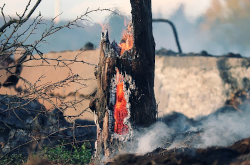소문

Today we talk about fire. Any kind of fire -- from a campfire to a lit match -- gives off smoke. This fact about fire relates to today’s idiom: There is no smoke without fire.
Before we continue, let’s talk about two words often used to explain this idiom: rumor and gossip.
Rumors and gossip are stories or pieces of information that are passed from person to person but have not been proven to be true. They are often about something bad.
One meaning of “there’s no Smoke without fire” is that rumors and gossip often have some truth behind them.
If the word on the street is that something is really bad, it just might be. Or if you hear unpleasant things about someone or something from many different people, there may be some truth to it. Maybe.
Here’s an example:
I think we should start looking for another job. I’ve heard that this bank is going under.
It could be just gossip.
But usually, there’s no smoke without fire.
In other words, there must be at least some truth to all the talk. The logic is this: If many people are saying that something bad is happening, it could be partly true.
We say this idiom several ways. You can say, “there’s no smoke without fire.” Or you can say, “where there’s smoke there’s fire.” You can even simply say, “where there’s smoke…” without continuing the rest of the sentence. People will definitely understand your meaning.
Here is another example.
Hey, I hear you’re going out with that new guy at work.
We just went for a long walk together. That’s about it.
Well, be careful. Rumor has it that he is bad news.
What kind of bad news?
Well, he’s been married before.
So. It’s no crime to have a failed marriage.
Right. But he’s been married FOUR times. My cousin knows a former wife of his. She says the guy owes money all over town.
This is just gossip.
Look, I’m just saying be careful. Where there’s smoke. Yeah, you know.

